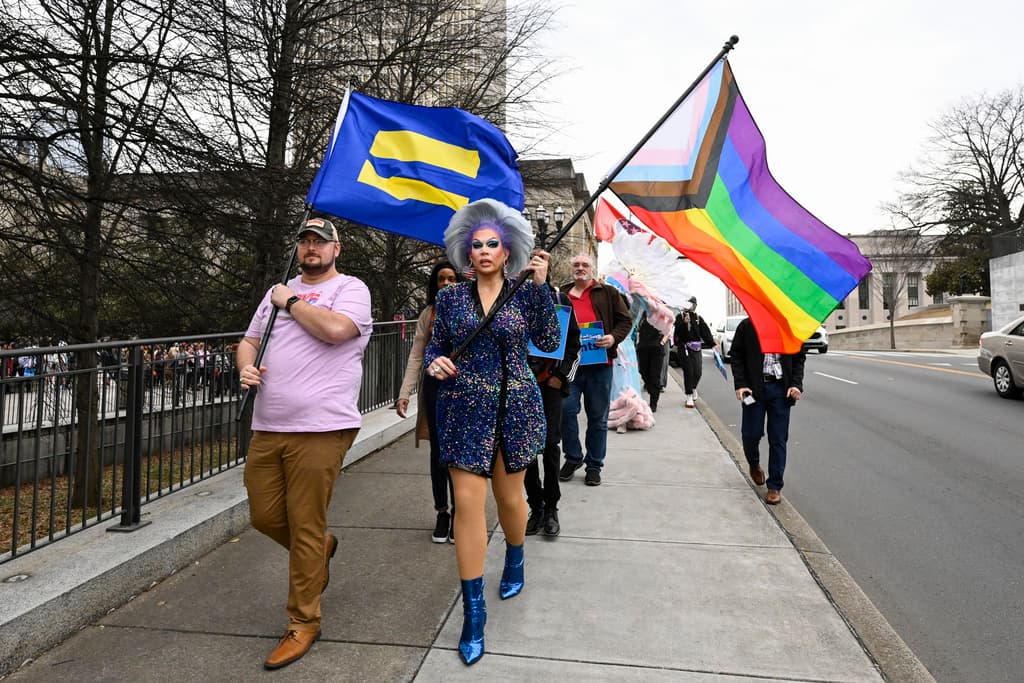Support Grows for Suit Against Connecticut’s Policy Allowing Transgender Athletes To Compete in Women’s Sports
The suit seeks to revive gender equality in sports and set ‘a national standard.’

A federal lawsuit against Connecticut’s policy on transgender athletes, with legal backing from dozens of top female athletes, is on track to reach the Supreme Court.
Four female track-and-field athletes are suing the Connecticut Interscholastic Athletic Conference after losing athletic events to biologically male athletes who identify as transgender women. The lawsuit was previously dismissed by two lower courts but was revived last week when all 15 active judges on the Second Circuit of the United States Court of Appeals at Manhattan declared that the female athletes were deprived of their Title IX right to “equal athletic opportunity.”
From swimming to volleyball and weightlifting, transgender athletes’ participation in women’s sports has sparked heated legal battles in recent years. What’s significant about this suit, Soule v. Connecticut Association of Schools, is the breadth of support it has attracted from influential female athletes from the LGTBQ community who otherwise tend to back progressive causes, including a professional tennis legend, Martina Navratilova, and two Olympic swimmers, Nancy Hogshead-Makar and Donna de Varona.
“Female athletes across the country, at all levels of sports, stand on the precipice of permanently losing their access to equal opportunity and safety in sports,” 73 female athletes, coaches, sports officials, and parents asserted in an amicus brief filed alongside the four students in March. “Based on their biological sex, they are at risk of being pushed aside in law and in life in a permanently damaging and irreversible way.”
The circuit court appeared to heed this exhortation when it voted to reinstate the suit brought by the four athletes — Selina Soule, Chelsea Mitchell, Alanna Smith, and Ashley Nicoletti. The judges recognized that “the alleged injury” these women suffered, by losing athletic titles and opportunities to biological males, “is plausibly redressable by monetary and injunctive relief.” At stake is the “equal athletic opportunity” enshrined in civil rights law.
While Soule will proceed to federal district court, either side of the case is expected to appeal the decision until it reaches the Supreme Court, a civil rights attorney who served as senior counsel on the amicus brief, Amos Jones, tells the Sun. “These 73 women came to us because they were feeling unheard,” he says. “We think it’s very clearly nonsensical and unfair to harm the competitive opportunities of women who fought very hard for Title IX.”
Some schools and colleges across the country have sought to enact prohibitions on transgender athletes competing against students who have not changed their birth sex. Those bans are being challenged by the ACLU in Idaho, Tennessee, and West Virginia. The Biden administration, which is firmly on the side of the transgender lobby, has also introduced a proposal to forbid such bans, a move that would fundamentally alter the landmark gender-equity protections of Title IX.
“I am disheartened by the political binary on this question,” Mr. Jones, who describes himself as “classically pro-woman,” says. “This does not have to be zero-sum.” He espouses the traditionally liberal ideal of separating women’s and men’s sports so that each sex has equal opportunities to excel. “The position is not to ban transgender athletes — all people should play sports,” he says. “Where they play is the issue — and what’s fair and sensible.”
The specific policy in Soule that has been applied by CIAC for nearly a decade aims to provide transgender student-athletes with opportunities that are “consistent with their gender identity.” A Connecticut judge sided with this policy in 2021 when dismissing the case, a decision that was affirmed by a three-judge panel of the Second Circuit in August 2022. It ruled that the students, who had already graduated, failed to demonstrate legal standing.
The numbers, though, don’t lie. Within three years of competing in Connecticut girls’ high school track, the two biologically male athletes who benefitted from the state’s policy toward transgender athletes — Andraya Yearwood and Terry Miller — broke 17 girls’ track meet records and cinched 15 women’s state track championship titles.
For one of the plaintiffs, Ms. Mitchell, “four times she was the fastest female in a women’s state championship race,” a legal nonprofit, the Alliance Defending Freedom, which represents her and the other female athletes, asserts in a statement. “And four times she watched that title, honor, and recognition go to a male athlete instead.”
The American Civil Liberties Union and its Connecticut branch, representing Messrs. Yearwood and Miller, presented the latest ruling as a victory. “Today’s narrow decision,” the groups said in a joint statement, “lays a strong foundation for the district courts to reject these baseless claims on the merits.”
They must, though, contend with the legal defenses wielded by those who believe “that female athletes are damaged in tangible ways when men are allowed to compete against them and sports are no longer fair and equal,” the attorney who spearheaded the amicus brief, Kristi Burton Brown, tells the Sun. “We hope equality in sports for women soon returns as a national standard.”

